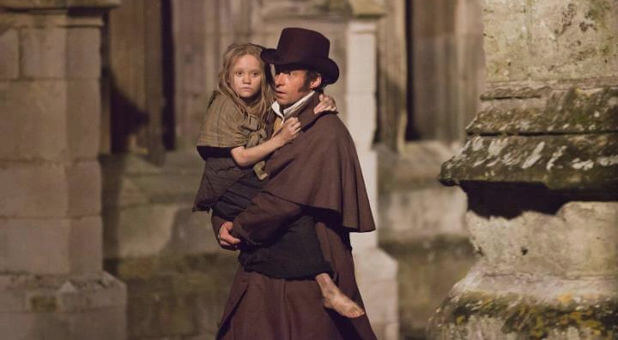Set during 19th-century France, Les Misérables is a story of broken dreams, unrequited love, passion, sacrifice and, ultimately, redemption.
The stage musical adaptation of the classic Victor Hugo novel of the same name is one of the most successful and beloved shows in the world. The longest-running musical of all time recently celebrated 25 years, and will mark a new milestone on Christmas Day with the release of the film. Les Mis features an impressive cast, and is produced by Cameron Mackintosh (Cats, Phantom of the Opera and Mary Poppins on Broadway) and directed by Tom Hooper (The King’s Speech).
Hugh Jackman stars as Jean Valjean, a thief who has just served 19 years in prison. In the beginning of the film he squares off with Inspector Javert (Russell Crowe), who sees Valjean as a man worthy of death, and believes he could never change into a good man.
With papers stamped as a dangerous man, Valjean has nowhere to go. He encounters a bishop, who takes the criminal in. In a true picture of grace and love, the bishop provides Valjean with food and a bed for the night.
Unable to recognize grace, the desperate Valjean wakes in a panic in the middle of the night, gathers all the valuable silver he can find and runs. The police catch him and bring him back to the bishop, whom they expect will say Valjean stole from him. Much to everyone’s surprise, the bishop insists that he gave Valjean the silver, and even scolds him for forgetting “the best”—two candlesticks from the dinner table.
Valjean is speechless as the bishop sings: “And remember this, my brother; see in this some higher plan/ You must use this precious silver to become an honest man/ By the witness of the martyrs, by the passion and the blood/ God has raised you out of darkness. I have bought your soul for God.”
This refrain becomes the theme for Valjean’s character. “Through that contact with the Bishop, [Valjean] learns to have compassion and faith,” Hooper explained. At this point in the movie, it was clear that grace and redemption would be central to the story.
Fast-forward nearly a decade later, and we meet Fantine (Anne Hathaway), who is forced into cutting off all her hair, selling her teeth and becoming a prostitute so she can afford to care for her daughter, Cosette.
Now living as Monsieur Madeleine, Valjean runs into Javert, who discovers his real identity. Valjean does not wish to evade the law, but he promised a dying Fantene that he will care for her daughter. He adopts Cosette and they escape Javert’s wrath.
The movie flashes forward another nine years. Cosette (Amanda Seyfreid) is now a young woman and the French Revolution has begun. Valjean has faithfully taken care of her, fulfilling his promise to Fantine.
Though it’s been nearly 20 years since Valjean broke his parole, Javert has not given up his quest to find the former criminal.
Javert is portrayed as the villain in the film, though he is an honest man just doing what he believes God wants him to do. In the end, he is consumed by his desire to put Valjean behind bars, and cannot deal with the grace Valjean affords him when Javert’s life is in his hands.
Crosswalk.com puts it well: “The lesson of grace to be learned from Les Misérables is a simple one: The Law cannot save us, for The Law serves brokenly in a broken world. Extending God’s grace, however, can illuminate and transform. Loving God, and loving those whom God has placed in our lives, is the closest thing to seeing God that we can have this side of eternity.”
Fans of the operetta—which means there are very few spoken words—are sure to enjoy the film adaptation, out next week. Though it lags at parts and is perhaps overly long with a running time of 158 minutes, the music and acting are dramatic and enjoyable.
Les Mis is rated PG-13 for adult themes, violence and language. This content is not meant to be exploitative, but to give credibility to the story and to pull at our heartstrings. There is some sexual content in two scenes, though no nudity is shown. There are also a few curse words and violence. The last portion of the film follows resisters to the French army, and some brutal deaths are portrayed, including the murder of a young boy by a French soldier.
Though Les Mis may not be suitable for children or young teens, its message of grace and redemption is certainly one I can get behind—especially in a world where Hollywood seems bent on extinguishing any Christian theme.














































